Lean Analytics
Growth
+ 4 more ...
How Lean Analytics Can Drive Growth in Established Businesses

18 Jun 2025
by Nadiy, Senior Content Writer

18 Jun 2025
by Nadiy, Senior Content Writer
Lean Analytics
Growth
Scalability
Software Development
Mobile App Development
Web App Development
How Lean Analytics Can Drive Growth in Established Businesses
Table of contents
Contact us
We will get back to you in the next 48 hours.

Unlock the secrets to accelerating growth in your established business with Lean Analytics. Learn how focusing on the right metrics and making data-driven decisions can help you refine strategies, optimize processes, and drive smarter, faster growth.
key takeaways
Businesses today, especially established ones, often face the challenge of balancing day-to-day operations with strategic growth. In an era where data is abundant but not always actionable, Lean Analytics emerges as the game-changer for companies aiming to unlock sustainable growth.
This data-driven approach isn’t just for startups looking for their first customers—it’s a powerful tool for companies that are already operating but need to refine their strategies, boost efficiency, and scale more effectively. Lean Analytics focuses on identifying the right data to track and using that data to optimize decision-making.
In this blog, we will explore how established businesses can apply Lean Analytics to drive growth, overcome operational hurdles, and stay competitive in a constantly evolving market.
What is Lean Analytics and Why Should You Care?
At its core, Lean Analytics is about using key metrics to test hypotheses, validate business models, and optimize processes. It’s about focusing on a few critical data points that tell you whether your business is heading in the right direction.
For established businesses, this method helps shift from just tracking data to actively using it to drive smarter decisions.
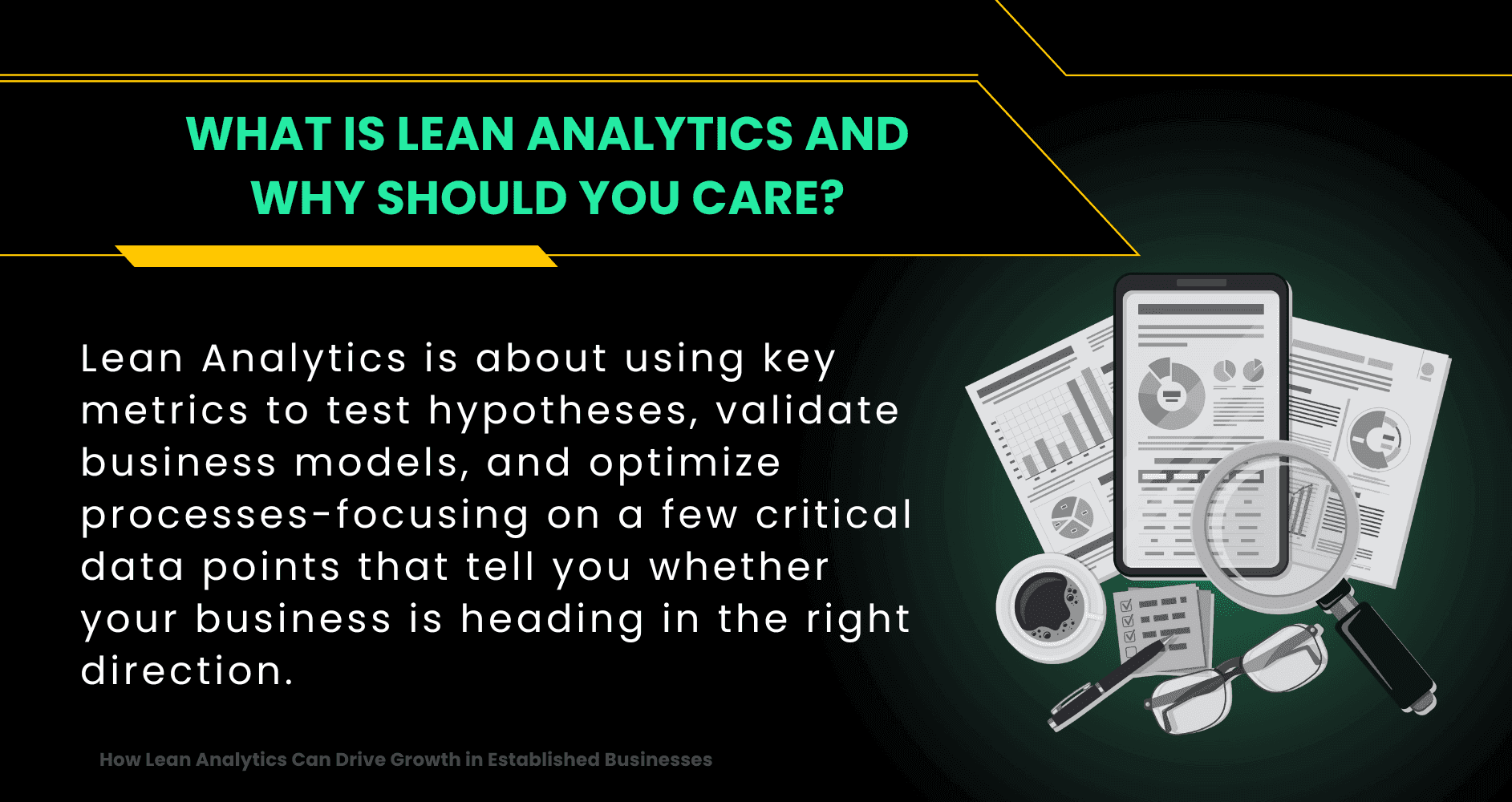
In the chaos of running an established company, it’s easy to get lost in the flood of numbers and reports. Lean Analytics helps cut through the chaos by identifying the one key metric that will make or break your business.
Whether it's improving customer acquisition, refining your product offerings, or streamlining operations, Lean Analytics gives businesses the insights they need to make fast, informed decisions.
How Established Businesses Can Apply Lean Analytics for Real Growth
While Lean Analytics has its roots in the fast-paced world of startups, it’s a powerful framework that established businesses can leverage to uncover growth opportunities, improve efficiency, and stay competitive in changing markets.
The key difference? Mature companies already have a wealth of data, customers, and processes in place—what they often lack is a clear, focused way to use that information to drive meaningful action.
Let’s explore how you can apply lean analytics into your business:
1. Identifying Your Key Metrics: The Foundation of Lean Analytics
One of the first steps in applying Lean Analytics is identifying the key metrics that matter most to your business. For an established company, this can be a tricky process.
The metrics you choose should directly relate to your growth objectives—whether that’s increasing revenue, improving customer retention, or reducing operational costs.
Start by asking yourself: What data point will best measure the effectiveness of my business strategy?
For instance, if you’re focusing on improving customer retention, metrics like customer lifetime value (CLV) and churn rate are essential. If your goal is to optimize marketing efforts, metrics such as customer acquisition cost (CAC) and conversion rate will be more valuable.
Once you have your key metrics, use them as your guiding light. All decisions, strategies, and tests should aim to move these numbers in the right direction.
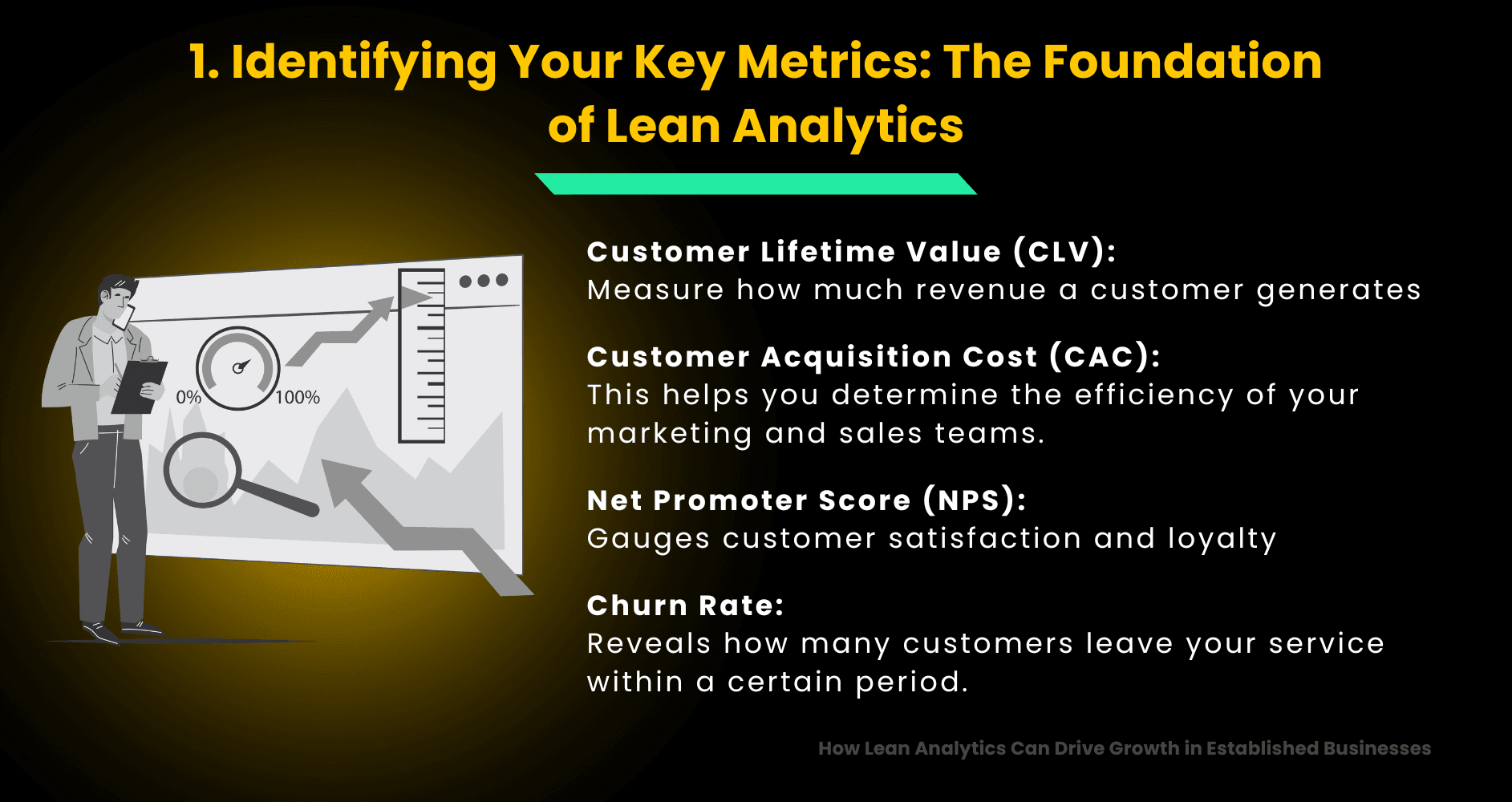
Key Metrics to Consider for Established Businesses:
- Customer Lifetime Value (CLV): Measure how much revenue a customer generates over their relationship with your brand. This helps in setting a benchmark for future sales and marketing investments.
- Customer Acquisition Cost (CAC): Knowing how much it costs to acquire each customer helps you determine the efficiency of your marketing and sales teams.
- Churn Rate: A critical metric to understand customer retention, churn rate reveals how many customers leave your service within a certain period. This directly affects your revenue growth.
- Net Promoter Score (NPS): This metric helps gauge customer satisfaction and loyalty, providing insights into potential areas for product or service improvements.
2. Data-Driven Experimentation: Testing and Validating Hypotheses
Once you’ve identified the right metrics, it’s time to put Lean Analytics into action. Lean Analytics thrives on experimentation—testing hypotheses, validating assumptions, and adapting based on the data you collect.
For established businesses, this process involves rethinking your current strategies and being willing to make changes based on data-driven insights.
Start by formulating hypotheses that align with your growth objectives. For example, if you believe that improving the customer experience will reduce churn, design an experiment to test this.
Collect data, measure the outcomes, and analyze whether the hypothesis holds true. If it does, great! You have valuable insights to refine your strategy. If it doesn’t, pivot and test another hypothesis.
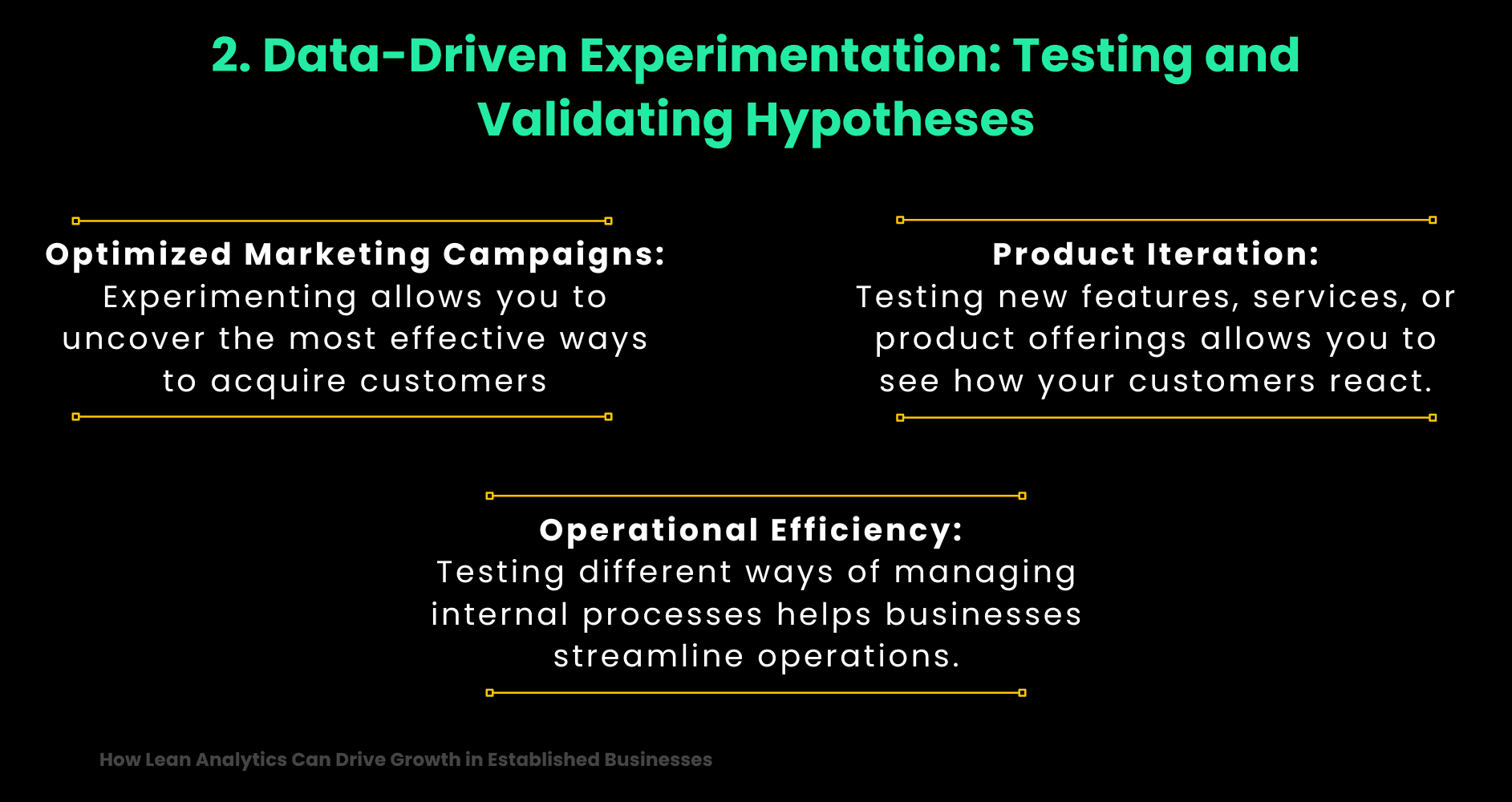
How Experimentation Drives Growth:
- Optimized Marketing Campaigns: By experimenting with different messages, channels, and campaigns, you can uncover the most effective ways to acquire customers, maximizing your return on investment.
- Product Iteration: Testing new features, services, or product offerings allows you to see how your customers react. These insights enable you to develop products that meet their needs more effectively, boosting satisfaction and loyalty.
- Operational Efficiency: By testing different ways of managing internal processes (e.g., automation, resource allocation), Lean Analytics helps businesses streamline operations, reducing waste and improving profitability.
Want to find out how much it costs to build your dream app or web app?
3. Using Data to Make Smarter Decisions Faster
In an established business, speed and agility are crucial, but it’s not always easy to make swift decisions when you’re surrounded by complex data.
Lean Analytics helps businesses cut through the noise and make faster decisions by focusing only on the data that matters most.
Imagine you’re deciding whether to invest more in marketing, expand into new regions, or launch a new product. Lean Analytics provides a structured framework to make this decision easier.
By focusing on your key metrics, you can determine which option has the highest potential for growth based on concrete data.
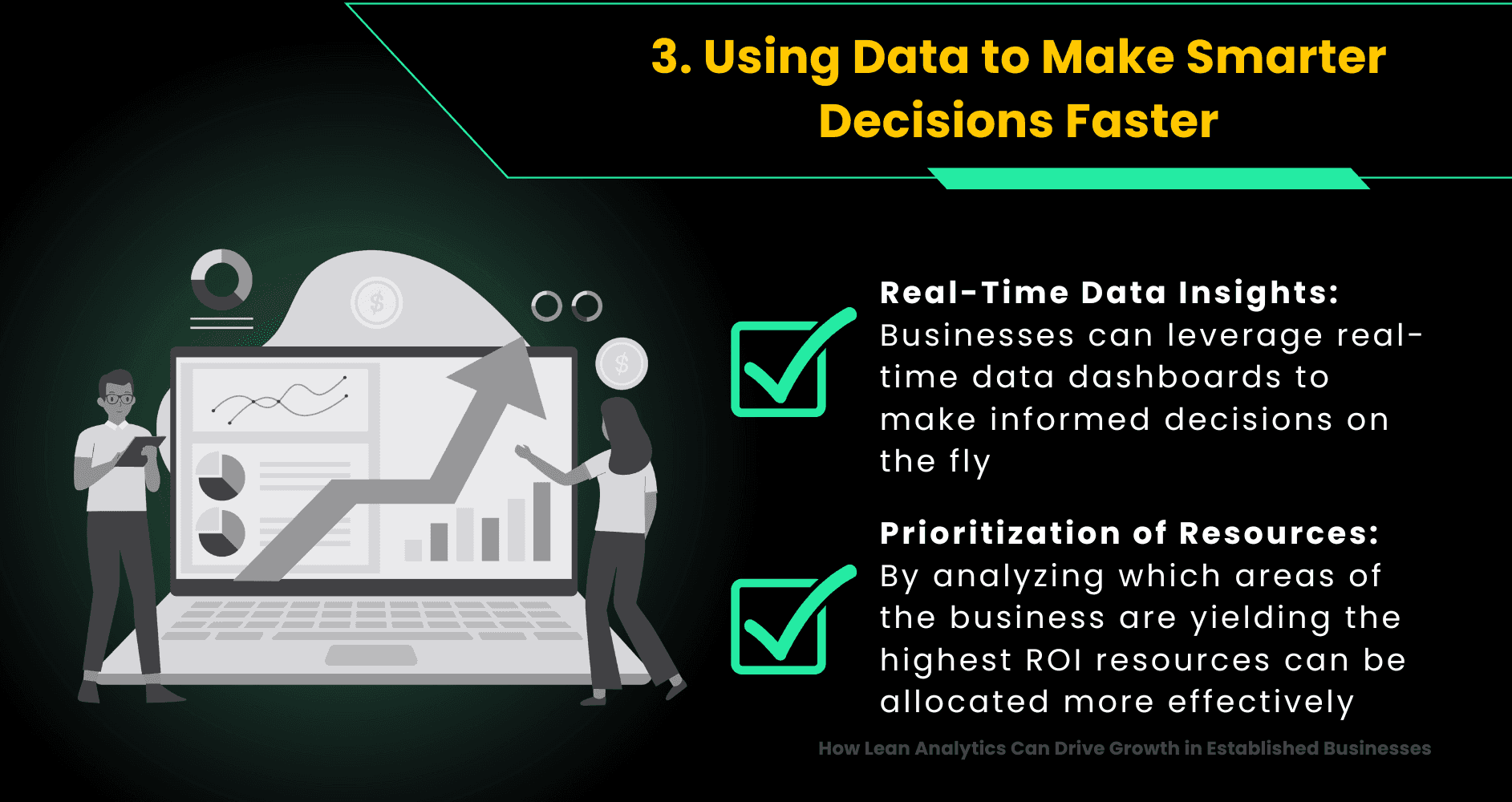
Faster Decision-Making with Lean Analytics:
- Real-Time Data Insights: With Lean Analytics, businesses can leverage real-time data dashboards to make informed decisions on the fly. This eliminates guesswork and speeds up the decision-making process.
- Prioritization of Resources: By analyzing which areas of the business are yielding the highest ROI, Lean Analytics helps businesses allocate resources more effectively, ensuring that efforts are concentrated where they matter most.
4. Continuous Improvement: Building a Culture of Data-Driven Growth
Applying Lean Analytics isn't a one-time exercise; it’s a continuous process. Once you've implemented data-driven decision-making into your business, the next step is to build a culture of continuous improvement.
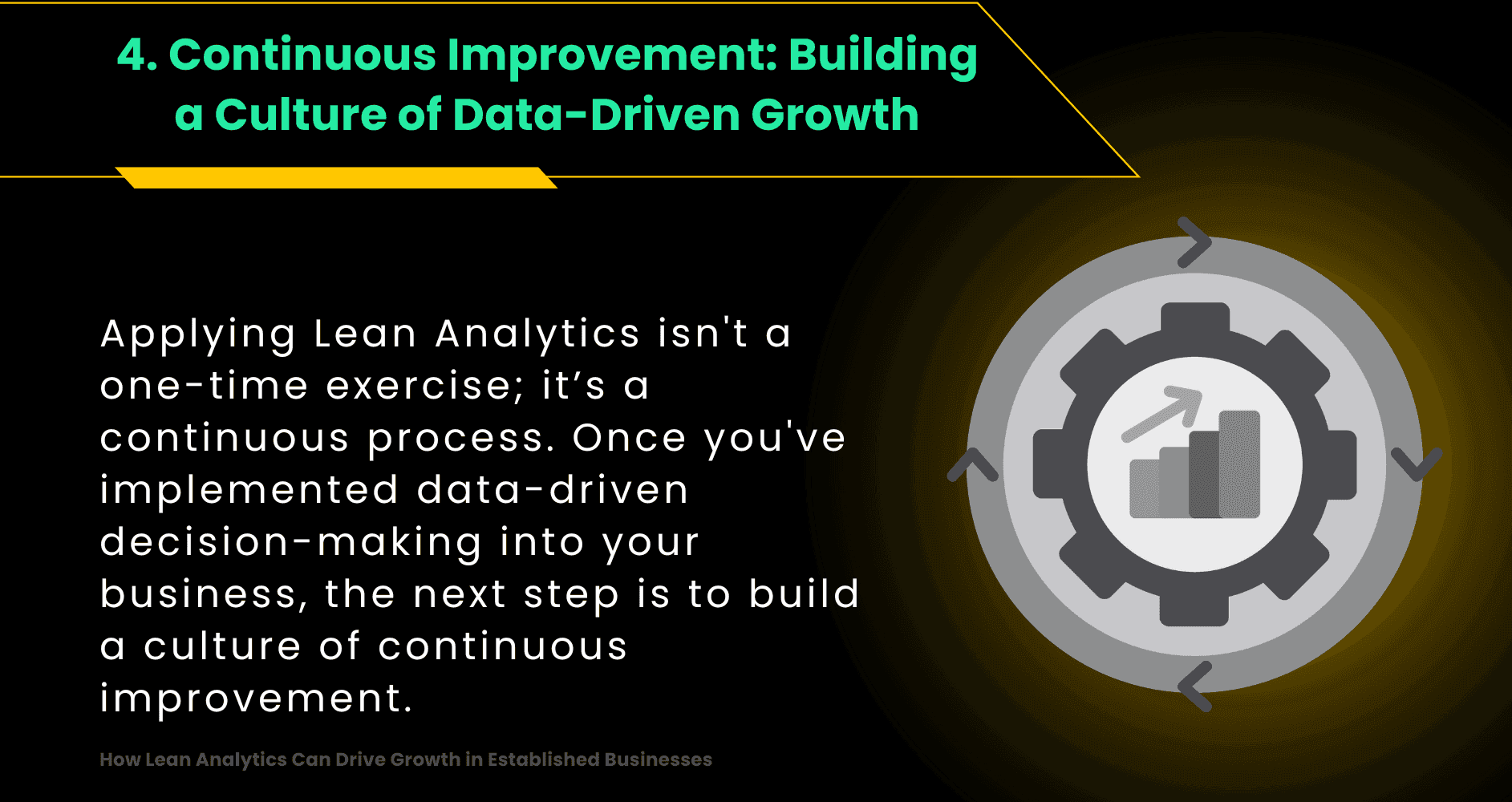
In established businesses, complacency can be a challenge. Lean Analytics fosters a mindset of always seeking better solutions, optimizing processes, and staying adaptable.
This culture of constant learning and improvement can help companies maintain their competitive edge and adapt to changing market conditions.
Lizard Global’s Expertise in Driving Growth with Lean Analytics
At Lizard Global, we specialize in helping businesses navigate the complexities of digital transformation, including applying Lean Analytics to drive growth. Whether you're looking to refine your product strategy, optimize your marketing efforts, or improve customer retention, our team of experts is here to help.
Here’s how we can support your growth journey:
- Digital Strategy & Innovation Consulting: Align your business goals with smart, tech-driven strategies that turn insights into action.
- Lean Analytics & Data Consultancy: Identify, track, and optimize the key metrics that matter most to your growth.
- UI/UX Design: Deliver user experiences that keep customers engaged and coming back, using data-backed design thinking.
- Mobile App & Web App Development: Build high-performance apps that are optimized for user experience and conversion.
- Product Strategy & MVP Development: Validate ideas quickly and cost-effectively through strategic planning and minimum viable products.
We work with you to identify the most impactful metrics, design effective experiments, and implement data-driven strategies that will take your business to the next level. Let us help you harness the power of Lean Analytics to achieve your business goals and sustain long-term growth.
Join 2000+ subscribers
Stay in the loop with everything you need to know

Unlock the secrets to accelerating growth in your established business with Lean Analytics. Learn how focusing on the right metrics and making data-driven decisions can help you refine strategies, optimize processes, and drive smarter, faster growth.
Businesses today, especially established ones, often face the challenge of balancing day-to-day operations with strategic growth. In an era where data is abundant but not always actionable, Lean Analytics emerges as the game-changer for companies aiming to unlock sustainable growth.
This data-driven approach isn’t just for startups looking for their first customers—it’s a powerful tool for companies that are already operating but need to refine their strategies, boost efficiency, and scale more effectively. Lean Analytics focuses on identifying the right data to track and using that data to optimize decision-making.
In this blog, we will explore how established businesses can apply Lean Analytics to drive growth, overcome operational hurdles, and stay competitive in a constantly evolving market.
What is Lean Analytics and Why Should You Care?
At its core, Lean Analytics is about using key metrics to test hypotheses, validate business models, and optimize processes. It’s about focusing on a few critical data points that tell you whether your business is heading in the right direction.
For established businesses, this method helps shift from just tracking data to actively using it to drive smarter decisions.

In the chaos of running an established company, it’s easy to get lost in the flood of numbers and reports. Lean Analytics helps cut through the chaos by identifying the one key metric that will make or break your business.
Whether it's improving customer acquisition, refining your product offerings, or streamlining operations, Lean Analytics gives businesses the insights they need to make fast, informed decisions.
How Established Businesses Can Apply Lean Analytics for Real Growth
While Lean Analytics has its roots in the fast-paced world of startups, it’s a powerful framework that established businesses can leverage to uncover growth opportunities, improve efficiency, and stay competitive in changing markets.
The key difference? Mature companies already have a wealth of data, customers, and processes in place—what they often lack is a clear, focused way to use that information to drive meaningful action.
Let’s explore how you can apply lean analytics into your business:
1. Identifying Your Key Metrics: The Foundation of Lean Analytics
One of the first steps in applying Lean Analytics is identifying the key metrics that matter most to your business. For an established company, this can be a tricky process.
The metrics you choose should directly relate to your growth objectives—whether that’s increasing revenue, improving customer retention, or reducing operational costs.
Start by asking yourself: What data point will best measure the effectiveness of my business strategy?
For instance, if you’re focusing on improving customer retention, metrics like customer lifetime value (CLV) and churn rate are essential. If your goal is to optimize marketing efforts, metrics such as customer acquisition cost (CAC) and conversion rate will be more valuable.
Once you have your key metrics, use them as your guiding light. All decisions, strategies, and tests should aim to move these numbers in the right direction.

Key Metrics to Consider for Established Businesses:
- Customer Lifetime Value (CLV): Measure how much revenue a customer generates over their relationship with your brand. This helps in setting a benchmark for future sales and marketing investments.
- Customer Acquisition Cost (CAC): Knowing how much it costs to acquire each customer helps you determine the efficiency of your marketing and sales teams.
- Churn Rate: A critical metric to understand customer retention, churn rate reveals how many customers leave your service within a certain period. This directly affects your revenue growth.
- Net Promoter Score (NPS): This metric helps gauge customer satisfaction and loyalty, providing insights into potential areas for product or service improvements.
2. Data-Driven Experimentation: Testing and Validating Hypotheses
Once you’ve identified the right metrics, it’s time to put Lean Analytics into action. Lean Analytics thrives on experimentation—testing hypotheses, validating assumptions, and adapting based on the data you collect.
For established businesses, this process involves rethinking your current strategies and being willing to make changes based on data-driven insights.
Start by formulating hypotheses that align with your growth objectives. For example, if you believe that improving the customer experience will reduce churn, design an experiment to test this.
Collect data, measure the outcomes, and analyze whether the hypothesis holds true. If it does, great! You have valuable insights to refine your strategy. If it doesn’t, pivot and test another hypothesis.

How Experimentation Drives Growth:
- Optimized Marketing Campaigns: By experimenting with different messages, channels, and campaigns, you can uncover the most effective ways to acquire customers, maximizing your return on investment.
- Product Iteration: Testing new features, services, or product offerings allows you to see how your customers react. These insights enable you to develop products that meet their needs more effectively, boosting satisfaction and loyalty.
- Operational Efficiency: By testing different ways of managing internal processes (e.g., automation, resource allocation), Lean Analytics helps businesses streamline operations, reducing waste and improving profitability.
Want to find out how much it costs to build your dream app or web app?
3. Using Data to Make Smarter Decisions Faster
In an established business, speed and agility are crucial, but it’s not always easy to make swift decisions when you’re surrounded by complex data.
Lean Analytics helps businesses cut through the noise and make faster decisions by focusing only on the data that matters most.
Imagine you’re deciding whether to invest more in marketing, expand into new regions, or launch a new product. Lean Analytics provides a structured framework to make this decision easier.
By focusing on your key metrics, you can determine which option has the highest potential for growth based on concrete data.

Faster Decision-Making with Lean Analytics:
- Real-Time Data Insights: With Lean Analytics, businesses can leverage real-time data dashboards to make informed decisions on the fly. This eliminates guesswork and speeds up the decision-making process.
- Prioritization of Resources: By analyzing which areas of the business are yielding the highest ROI, Lean Analytics helps businesses allocate resources more effectively, ensuring that efforts are concentrated where they matter most.
4. Continuous Improvement: Building a Culture of Data-Driven Growth
Applying Lean Analytics isn't a one-time exercise; it’s a continuous process. Once you've implemented data-driven decision-making into your business, the next step is to build a culture of continuous improvement.

In established businesses, complacency can be a challenge. Lean Analytics fosters a mindset of always seeking better solutions, optimizing processes, and staying adaptable.
This culture of constant learning and improvement can help companies maintain their competitive edge and adapt to changing market conditions.
Lizard Global’s Expertise in Driving Growth with Lean Analytics
At Lizard Global, we specialize in helping businesses navigate the complexities of digital transformation, including applying Lean Analytics to drive growth. Whether you're looking to refine your product strategy, optimize your marketing efforts, or improve customer retention, our team of experts is here to help.
Here’s how we can support your growth journey:
- Digital Strategy & Innovation Consulting: Align your business goals with smart, tech-driven strategies that turn insights into action.
- Lean Analytics & Data Consultancy: Identify, track, and optimize the key metrics that matter most to your growth.
- UI/UX Design: Deliver user experiences that keep customers engaged and coming back, using data-backed design thinking.
- Mobile App & Web App Development: Build high-performance apps that are optimized for user experience and conversion.
- Product Strategy & MVP Development: Validate ideas quickly and cost-effectively through strategic planning and minimum viable products.
We work with you to identify the most impactful metrics, design effective experiments, and implement data-driven strategies that will take your business to the next level. Let us help you harness the power of Lean Analytics to achieve your business goals and sustain long-term growth.
Join 2000+ subscribers
Stay in the loop with everything you need to know
FAQs

What is Lean Analytics, and how does it work?
How can Lean Analytics help an established business grow?
What are the key metrics for applying Lean Analytics in my business?
How can Lean Analytics improve decision-making in my business?
Is Lean Analytics only for startups or early-stage businesses?
What types of experiments should I run with Lean Analytics?
How does Lean Analytics contribute to operational efficiency?
similar reads







